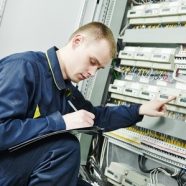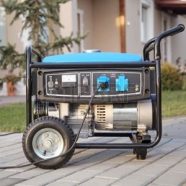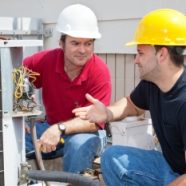What Does It Take to Become a State-Certified Electrical Contractor?
In the U.S. becoming a commercial electrical contractor is a multi-step process that requires study, practical experience, and various licensing exams. That’s a good thing too, because contractors literally work with something (electricity) that has the power of life and death. No one would let an unqualified surgeon perform surgery, and the same goes for our homes. Throughout the U.S. we’re choosy about who we allow to work with electrical power, and that’s a very good thing.
Various Types of License
Many people don’t realize that there is more than one kind of license for electrical contractors in Florida. These include:
- Electrical Contractor (Certified or Registered)
- Alarm Contractor I (Certified or Registered)
- Alarm Contractor II (Certified or Registered)
- Electrical Specialty Contractor (Certified or Registered)
Among the specialties that contractors can choose to be licensed for are:
- Residential Electrical Specialty
- Utility Line Specialty
- Lighting Maintenance Specialty
- Sign Specialty
- Limited Energy Specialty
Each of these types of license has slightly different requirements, and just because a contractor is licensed in one area, that does not mean that they can work in all areas of electrical installation, maintenance or repairs.
General Requirements for Licensing
Even though there are slightly different requirements for the different types of contractor licenses in Florida, there are a few basic criteria that each contractor will need to fulfill, regardless of their area of expertise and focus. These include:
- They must meet the minimum study requirements for licensing.
- They must meet the minimum experience requirements for the type of licensing they are seeking.
- They must pass the relevant exams, which may include industry specific exams as well as exams about business practices and other topics.
- They must maintain the minimum contractor’s insurance for their area of specialty at all times.
- Contractors will often undergo credit checks, and they will be required to meet minimum continuing education requirements.
As you can see, there’s a lot that goes into becoming an electrical contractor in Florida, whether you specialize in residential installations, commercial electrical, electrical maintenance or any other field.
As a company, like most professional electrical contractors in the State of Florida, we’re glad that these regulations are in place, because they help to ensure that customers who use licensed contractors can expect to get the appropriate electrical protection in West Palm Beach that we would want in our own homes.
When you work with a licensed electrical contractor, you can be sure that they know the business, that they have experience in the field, and that they have the documentation necessary to certify your installation, and the insurance to protect you if something goes wrong.
Always Choose a Licensed Contractor
Licensed electrical contractors have to go through a long process and jump through many hoops to get and stay licensed. That usually reflects in the rates they charge, although there are many out there that offer reasonably priced service and great value for money.
If there’s one piece of advice we can offer any potential customer, however, it is to always choose a licensed contractor. Even if someone who is not licensed offers to do a job for you at a great price, and you’re tempted, remember that unlicensed contractors cannot perform legal electrical installations, repairs or maintenance. More importantly, if you don’t use a licensed contractor, and a failure in their installation or electrical protection measures results in a fire or any other damage, you might not be covered by your insurance policies.
Just save yourself the trouble, and hire a professional. They’ll get the job done right, and you’ll have peace of mind.
Read MoreGizmos and Gadgets: How Smart Home Trends Are Changing Electrical Installations
At one time, if you did residential electrical in South Florida, you knew exactly what to expect. New construction electrical was pretty much the same, with a few variations in size and quantity of outlets, perhaps a bigger panel, and a few other minor differences. Those days are rapidly becoming a thing of the past, and the demand for smart home electrical systems to support a wide range of technologies is becoming much more common.
So far, there are a few contractors who have embraced this change, but much of the industry seems divided on whether these changes are good or bad.
Having been working in residential electrical in South Florida for some time, and in commercial and electrical maintenance, we’ve been watching these changes closely, and we’re excited about the possibilities.
What Sort of Changes Are We Seeing?
The term “smart home” really means networked home. Homes where lighting, blinds, music and entertainment systems and more are centrally controlled through an app or interface. On the surface, that all seems to happen as if by magic, but the reality is, there’s a lot more wiring and communications cables going into the walls of our homes. There’s additional power required for the equipment that makes the magic happen, panels typically need to be more complex and larger to accommodate the additional equipment required to run your home.
How Your Residential Electrical South Florida Installation Will Change
Whether your residential electrical South Florida contractor installs smart home equipment for you, or whether there’s another company taking care of that aspect of your new home, there will be changes to the wiring and electrical that will need to be made.
Additional cabling may be necessary, changes to the panel to cope with additional electrical requirements, additional outlets or junction boxes, and even changes to the types of lighting, because not all lighting is suitable for smart home system operation.
Whether your electrical contractor is taking care of the smart home equipment or not, there will be more planning involved too, since all the wiring and equipment will need to be in place before the walls of your home can be finished.
Choosing the Right Contractors
Perhaps the biggest change that smart homes are making in the electrical world is that it has become more important than ever to hire the right contractors for the job. With far more power now required to run your home, and a lot more equipment to safely install, electrical protection and careful planning has become more important than ever.
Integrating the various systems and elements is another factor, and if you are planning to build smart home technology into your new home or a renovation (even a very old home!), you definitely want to work with an experienced company, who can get the job done safely and on time, and who are good at working with any other specialists you bring on board.
The fact is, smart homes are the way of the future, and there are only going to be more gizmos and gadgets behind your walls in years to come. Make sure that the power and wiring that supports those gizmos is up to the job, and you’ll enjoy them all the more.
Read More4 Real World Electrical Disaster Stories
When you work in commercial electrical, and you pride yourself on attention to detail, quality installations and top notch electrical maintenance, you usually don’t want to think about electrical disaster stories. However, every once in awhile, it helps to look at real world examples of what can happen when you don’t do the right thing, or when you fail to take steps to ensure electrical protection. So here are a few electrical disaster stories that should give you food for thought!
1. Thomas Edison Sets Vanderbilt Parlor Alight, 1879
We might remember him as one of the greatest inventors who ever lived, but that doesn’t mean Thomas Edison didn’t make mistakes along the way. In 1879, he was asked to provide electric lighting in the Vanderbilt parlor. Since William Henry Vanderbilt was a wealthy benefactor, Edison obliged, but a wiring error lead to electricity being discharged into the wallpaper, which contained a conductive metal thread. The result was a fire that virtually destroyed the parlor!
2. Iroquois Theatre Fire, Chicago, December 30, 1903
Not long after electricity became a common fixture in buildings in the U.S., a stage light in the back of the theater overheated, ignited a velvet curtain, and started a fire that would eventually kill 602 people, making it the deadliest single building fire in U.S. history.
The accident can be attributed to poor fire safety, early lighting that overheated quickly, and the lack of emergency lighting to light the way out for victims.
3. New London School Explosion, Texas, March 18, 1937
The New London School Explosion was caused by a natural gas leak. More precisely, it was caused by a gas leak that came into contact with a bad electrical connection, causing the gas to ignite, and causing the structure to collapse. The estimated fatality count ranges from 296 to 319, depending on which source you consider more accurate.
Explosions like these lead to changes in how natural gas is supplied and used, but also highlighted the importance of safe, spark free electrical in homes that do use gas for heating and other purposes.
4. MGM Grand Hotel Fire, Las Vegas, November 21, 1980
Proof that electrical disasters weren’t relegated to the early days of electrified buildings, the MGM Grand Hotel in 1980 was caught in a conflagration that started with an electrical fire, was fed by PVC pipes and other synthetic materials, tore through 26 floors, killed 87 and injured more than 700. This accident was proof that even on large, high profile buildings, mistakes with electrical systems could be catastrophic.
Learn from the Past
One of the most important things disasters like these, and others, have taught us is that while electricity can power our lives, and is a critical part of civilization, it’s also very dangerous, with the potential to do severe damage.
It is absolutely critical that we learn from the mistakes of the past, and design electrical systems and installations for the future with better electrical protection methods in place, to ensure that residential and commercial electrical is safer for everyone.
Read MoreWhy Cheap Standby Generators May Cost More in the Long Term
Have you ever really thought about the term “grudge purchase?” You know the types of things we mean. Insurance. Dentistry. Car repairs. They’re all things we need, but we don’t really want to spend our hard earned money on them. While we’d like to believe otherwise, we realize that a standby generator or a whole home generator probably falls into the same category. They may be necessary for life in South Florida, but they’re not really sexy or exciting, are they?
That might be why so many people are tempted to buy cheap units, and hope for the best. We’ve seen how that turns out though, and we’d like to advise you against it. That cheap generator may cost less upfront, but there’s a good chance it will cost more in the long term, and here’s why.
Poor After Sales Service
When you buy a cheap generator, chances are you’re either getting it from a guy operating from the back of a van in an alleyway (very bad idea!), or you’re buying a unit that’s been imported from somewhere that makes dubious quality products for low prices.
In either case, while you may pay less upfront, you’re going to find that when you need after sales service (and you will), you will struggle to find it. You might not be able to get replacement parts. Service technicians may not be available. Or, if you bought from the guy in the van, you might simply not be able to find him.
Damage to Your Home
One of the biggest problems that we’ve seen when people buy a cheap standby generator or whole home generator is that there tends to be some sort of damage to your home at some point. Maybe the unit is installed incorrectly, maybe there’s insufficient electrical protection, or maybe it creates a short circuit or a power surge.
Whatever the reason for the damage, the results are usually extensive and costly. Some of the cases we’ve seen have included fires when faulty generators caught alight, or fried electronics when they were installed incorrectly and causes a power surge to appliances that were plugged in.
Trouble with Warranties
We’ve replaced a lot of standby generators over the years, and whenever it’s a cheap unit that we’ve switched out, we’ve heard a similar story. The home owner saved a little on the initial purchase, but when the unit stopped working properly and they tried to get it replaced under the warranty, they found that it was full of holes.
A Good Generator Is an Investment
There are good reasons we’re choosy about which generators we supply to our customers. Firstly, we’re not willing to put our name on anything we don’t believe in, and secondly, because we know that a good generator is an investment.
Good quality standby or whole home generators will serve you well, without any trouble, for many years to come. They’ll be there when you need them, and if they need a repair, we’ll be able to find the parts you need.
So if you are in the market for a generator, why not talk to us? We might not give you the cheapest unit out there, but we’ll still be here when the guy in the van has disappeared.
Read MoreElectrical Faults: Are There Clues in Your Utility Bills?
If you’ve ever received a utility bill that is much higher than normal, then you’ve probably had the same reaction everyone does. Chest pains, followed by an angry call to the electric company to tell them they’ve made a mistake. Often, it is an administrative error that sends your residential or commercial electrical bills skyrocketing, but sometimes, the cause is inside your home, and not with city administrators. Here’s what you know about how high electrical bills can be a clue that there’s something wrong with your wiring or that you need electrical protection.
Faulty Meter
The first, and most obvious electrical problem that may be causing spikes in your utility bills is that there is a faulty meter. If there is a problem with your electric meter, it may continue running even when everything in your home is switched off.
Most people don’t give their meter a second thought until they get a very high bill, but there are ways to check if it’s working properly. If you switch off every breaker in your home, and the meter is still turning, then that’s a clear sign that all is not well! If you do suspect that your meter is faulty, contact the electric company as soon as possible, as it will need to be repaired or replaced.
Faulty Water Heater
Another major cause of high power bills is a water heater that is not working properly. Sediment in a hot water heater tank, or build up on the element can mean that the unit has to work a lot harder to heat the water for your home, and those costs can add up quickly.
If it’s been awhile since you’ve replaced your hot water heater, or you’ve never had it replaced or checked, then this is definitely something you will want to investigate.
Faulty HVAC
Your air conditioner is another piece of equipment you will want to have checked if you have a much higher than normal power bill. Even a small refrigerant leak can cause your air conditioner to work much harder than usual, and that can cause a huge spike in your power bill. Worse still, since there won’t be a noticeable change in the noise or operation of the A/C unit, most people will have no idea until they get their power bill!
Shorts and Other Electrical Issues
Sometimes, spikes in power usage are due to short circuits, or power leaks. Sometimes, people find that there’s a concealed extension cord running from their garage to an alley or a neighbor, and someone is actually stealing power. In the case of the latter, you should call the cops, but in the case of the former, you definitely want an electrical contractor to take a look.
Short circuits or faulty wiring can be dangerous as well as costly, and if the power is leaking onto a conductor, they could have lethal consequences. If there is any concern, it’s always best to hire a professional to trace the problem, and offer solutions for electrical protection, and to ensure that your home is safe for everyone who lives there.
Never Ignore the Signs
A very high power bill is almost always a sign that something is amiss, unless you’ve had guests staying or started working on a major project in your garage, and you know why you’ve had a usage spike. If you’re not sure, call an electrician in South Florida, and get to the bottom of the problem. It’s the best solution all round.
Read MoreElectrical Upgrades: Turning a Private Home into a Beachfront Guesthouse
It’s a great dream. Turning your beach front home in Florida into a high end guest house, retiring from the rat race, and spending your days taking care of all the guests that are going to flock to your property to get sand between their toes and salt in their hair. However, there’s a little more to commercial renovations in South Florida than just hanging your shingle outside and hoping for the best.
Here’s what you need to know about the process of going from residential electrical to commercial electrical in a South Florida property, so that you can plan ahead.
Commercial Electrical Assessment
The first thing that you will need to do when you are converting a residential property to a commercial one is to have your electrical assessed, and to determine what changes will need to be made. Generally speaking, since commercial properties usually need more power than residential ones, an electrical panel upgrade will be a part of the upgrade, but there may be changes needed to wiring, lighting, kitchen electrical and more. The best way to get a clear picture of what you need is to have a professional commercial electrical contractor do this assessment for you.
Kitchen Upgrades
If you’re planning to convert your residential kitchen to a commercial one, then that will probably be one of the biggest changes you need to make to your electrical. Commercial appliances and equipment often require three phase power, and will almost certainly require that the wiring and power supply in your kitchen be upgraded.
Wiring and Lighting Upgrades
There are different requirements for electrical wiring and lighting in commercial buildings, and these are another area that will be addressed as a part of commercial renovations in South Florida. Wiring will be brought up to the relevant codes, and lighting may need to be added to comply with local codes and health and safety standards.
Backup Power
Another major change that you may consider if you are converting a residential property into a commercial one is to add backup power. Whether in the form of a standby generator or alternative power like solar panels, it’s a good idea to have commercial buildings outfitted to cope with South Florida’s unpredictable weather. After all, business doesn’t stop because there’s a storm!
Security and Smart Upgrades
The final element that you might consider when developing a plan for the electrical upgrades necessary to transform a residence into a guesthouse are security and “smart” upgrades. A commercial property is likely to require alarm systems, cameras, automated gates or garages and other upgrades, and those should all be factored into the initial assessment.
Ensuring You Get the Right Upgrades
As you can see, there’s a lot that goes into ensuring that your new guesthouse is electrically safe and sound, and ready for business. Make sure that you prioritize things like electrical too, because if you leave them until after you’ve made cosmetic changes and upgrades, you may find yourself paying more to repair finishes after changes are made.
Read More






Recent Comments